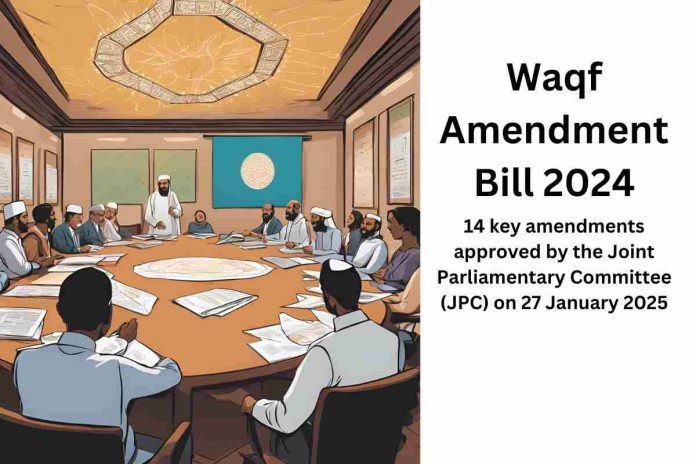The Waqf Amendment Bill 2024, reviewed by the Joint Parliamentary Committee (JPC), introduces significant changes to reform the management of Waqf properties in India. With 14 key amendments approved, the bill aims to enhance transparency, accountability, and efficiency within Waqf boards while addressing long-standing governance challenges.
Major Waqf Amendments Approved by JPC
The 14 key amendments approved by the Joint Parliamentary Committee (JPC) for the Waqf Amendment Bill 2024 focus on reforming the governance and management of Waqf properties in India. While specific details may vary depending on official reports, here’s a summarized breakdown based on the general direction of the amendments:
- Digitization of Records: Mandatory digitization of all Waqf property records to prevent unauthorized encroachments and improve transparency.
- Independent Auditing: Annual independent audits of Waqf boards to ensure financial accountability and detect irregularities.
- Enhanced State Oversight: State governments granted greater authority to monitor and regulate Waqf boards’ functioning.
- Dispute Resolution Mechanism: Establishment of dedicated tribunals or panels to expedite disputes over Waqf properties.
- Transparency in Fund Utilization: Clear guidelines on the use of Waqf funds to ensure they are allocated for community welfare purposes like education and healthcare.
- Restrictions on Leasing and Transfer: Stricter regulations for leasing or transferring Waqf properties to prevent undervaluation or misuse.
- Improved Appointment Process: Transparent and merit-based procedures for appointing members to Waqf boards.
- Submission of Progress Reports: Mandatory submission of regular performance and progress reports by Waqf boards to the government.
- Accountability Measures: Penalties for Waqf boards that fail to comply with governance and financial standards.
- Enhanced Legal Framework: Strengthening legal provisions to address encroachments and unauthorized occupation of Waqf properties.
- Capacity-Building Programs: Introduction of training and capacity-building programs for Waqf board officials to enhance efficiency.
- Central Database Creation: Development of a centralized national database for all Waqf properties to ensure uniformity and easy access to information.
- Streamlined Conflict Resolution: Clear processes for resolving conflicts between stakeholders, including community members and Waqf boards.
- Role of Local Authorities: Empowering local authorities to collaborate with Waqf boards in managing properties effectively.
These amendments aim to make Waqf boards more transparent, accountable, and efficient while ensuring that Waqf properties are utilized for their intended charitable and community purposes. For specific and official details, referring to the final bill text or government releases is recommended.
Political and Legislative Context On Waqf Amendment Bill
The bill’s amendments were proposed by the BJP-led NDA government and approved by the JPC after detailed deliberations. However, opposition parties under the INDIA bloc raised concerns over the procedural handling of the amendments. They alleged that proper parliamentary rules were not followed and that their suggestions were largely ignored during the review process.
Concerns Raised by the Opposition
While the amendments focus on reform, the opposition has expressed concerns that some changes might centralize power and undermine the autonomy of Waqf boards. They have also questioned the transparency of the JPC’s review process.
Expected Impact of the Amendments On Waqf Board
- Improved Governance: The amendments aim to address financial mismanagement and inefficiencies in Waqf board operations.
- Transparency and Trust: Digitization and independent audits will build public trust and reduce corruption.
- Empowered Local Governance: Enhanced oversight by state governments will ensure localized control and accountability.
- Efficient Dispute Resolution: The dedicated dispute resolution mechanism will expedite legal cases and prevent prolonged conflicts over Waqf properties.
Conclusion
The Waqf Amendment Bill 2024, with its 14 approved amendments, represents a significant step toward reforming the management of Waqf properties in India. While the changes aim to enhance accountability and transparency, their successful implementation will be key to achieving the desired outcomes. Ongoing debates highlight the need for a balanced approach that respects the community’s sentiments while ensuring robust governance.
Also Read: Sky Force Movie: A Film Based On 1965 Sargodha Airstrike True Event

